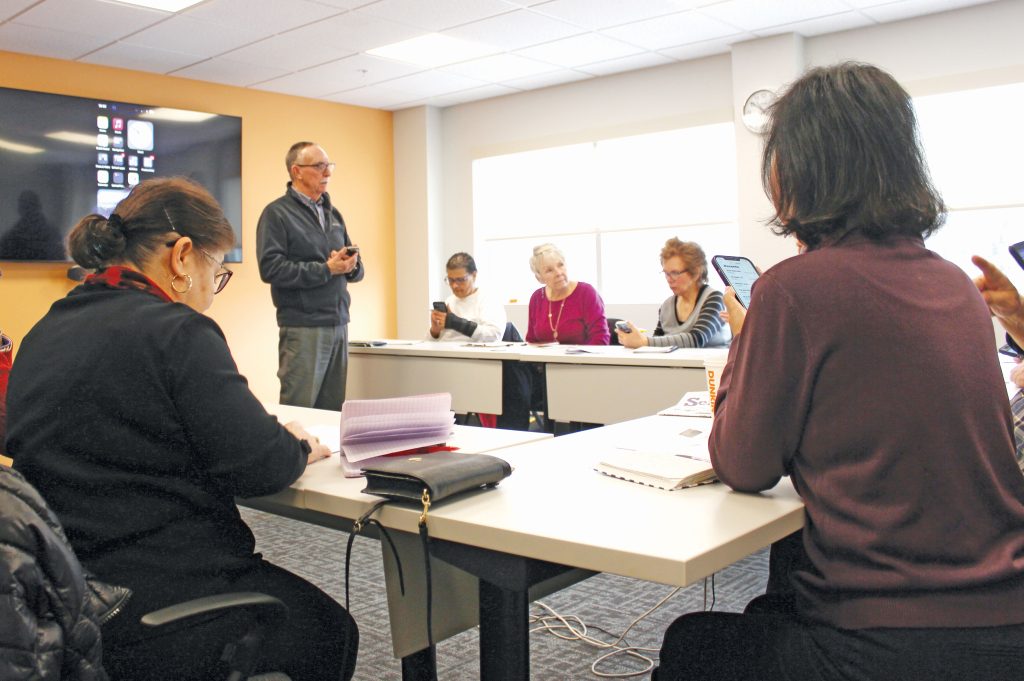At first, it might have been learning to use an ATM to be able to withdraw money from your bank account. Or, figuring out how to self-checkout at the grocery store.
Later, a potential employer or volunteer organization might have requested an application be completed online, or a primary care physician sent test results to a digital medical record.
Perhaps you needed a photo uploaded to renew a license. Or a physician requested a virtual appointment instead of an in-person visit.
In 2024, so many aspects of daily life require technology training and older adults who do not keep up risk being left behind.
But what might have led to a generation being lost, is instead becoming a movement to give seniors the support they need to connect — when they need to, where they need to, and, importantly, how they want to.
Coastline Elderly Services has been at the forefront of providing technology training in the South Coast since 2022 when it launched its popular series of computer and smartphone classes. Over the past 2.5 years, the state-designated Aging Services Access Point has helped more than 200 people learn to use their devices in small group sessions with highly individualized support.
The experience gave the nonprofit a better understanding of what older adults are looking for and led them to go back to the drawing board to develop new technology partnerships where they can “meet seniors where they’re at.”
“It means we’re developing classes and programs that help older adults use technology in ways they want to and also bringing classes to them in their community,” said Coastline Planning Director Zachary Boyer. “That can mean anything from helping them access online exercise classes from a local council on aging, take and send photos to family members, or clip digital coupons on a smartphone app. It depends on the person.”
Boyer said Coastline will bring its technology to seniors by partnering with local organizations like the Immigrants Assistance Center and the Massachusetts Association for the Blind and Visually Impaired as well as area councils on aging who they already work with. They will also host programs in each of the eight communities they serve as a state-appointed Aging Services Access Point.
It’s all possible through a multi-organization grant from the Massachusetts Broadband Institute that will distribute $3 million to 12 organizations over an 18-month period.
Coastline learned in December that it had been allotted $236,000 of the $3 million grant which officially kicked off this spring. The nonprofit, which helps older adults get services to allow them to live independently, is now finalizing details of the program’s implementation such as how many classes will be taught and what options will exist for one-on-one assistance.
“We are partnering with several organizations to best meet the digital needs of older adults in the South Coast,” said Coastline CEO Justin Lees. “Those discussions are still evolving but we expect trainings to begin this June and, through a new partnership with Tech Goes Home, to provide tablets and a year of internet access to those who participate.”
The Tech Goes Home partnership is one of the most exciting parts of the grant, said Boyer, because it will allow Coastline to reach people who may be interested in doing more with technology but haven’t had the access to devices or an internet connection to begin.
“We know how important access to the digital world can be for our elders,” said Marvin Venay, Chief External Affairs and Advocacy Officer at Tech Goes Home. “And we know that older adults often face unique challenges to getting online and using digital tools safely and effectively, including challenges with hardware, difficulty navigating the internet, potential barriers related to sight and hearing, linguistic obstacles, and more.”
“Our trainings include four core competencies – using your device, navigating the internet, video conferencing, and communicating via email – but then we work with instructors and learners to go deeper on the opportunities they care about most, whether that’s how to connect with loved ones or how to navigate patient healthcare portals,” Venay continued.
Tech Goes Home will also train Coastline’s trainer, Kraig Perry.
Coastline is not the only organization creating flexible and responsive programming. In a recent Zoom meeting, organized by the Massachusetts Healthy Aging Collaborative, MBI grantee organizations described successful efforts to help older adults connect using technology. Each organization offers unique programs based on seniors’ needs from using artificial intelligence in art programs to capacity-building for advocacy work and classes similar to what Coastline is doing.
Beyond this group, local councils on aging have been quietly building their technology options and libraries have been offering help formally and informally.
It’s good news because organizations who offer technology training have found that ongoing support is important.
In the MHAC Zoom call, western Massachusetts-based Way Finders, said they’d learned that some people leave training sessions ready and able to use what they learned immediately. Others need a refresher or multiple refreshers to feel comfortable, according to Beatrice Dewberry, Community Building and Engagement Director, who spoke on the call.
Anyone interested in learning more about technology classes can email Dionne Gomes at dgomes@coastlinenb.org or call her at 508-742-9160. Please include information on what you hope to do with technology after getting help.


Recent Comments